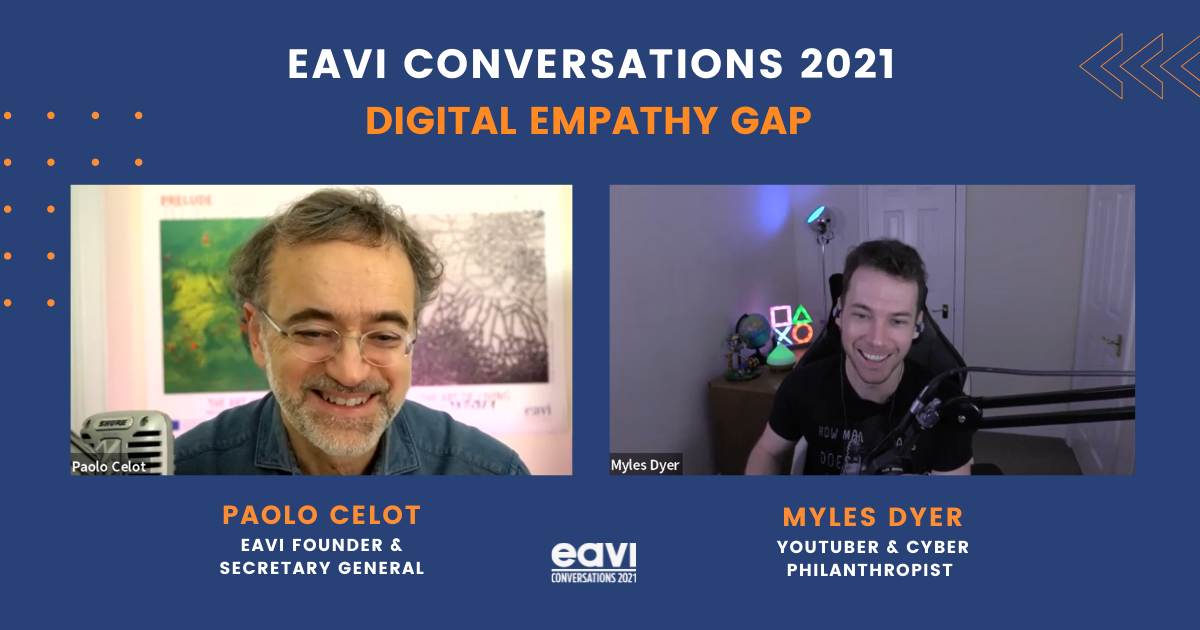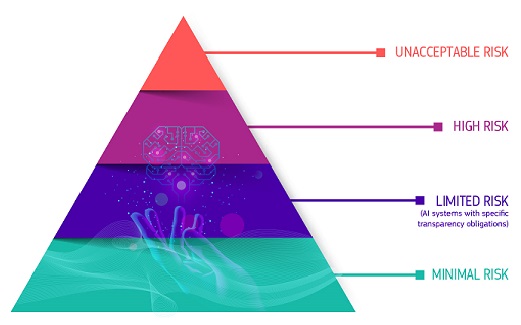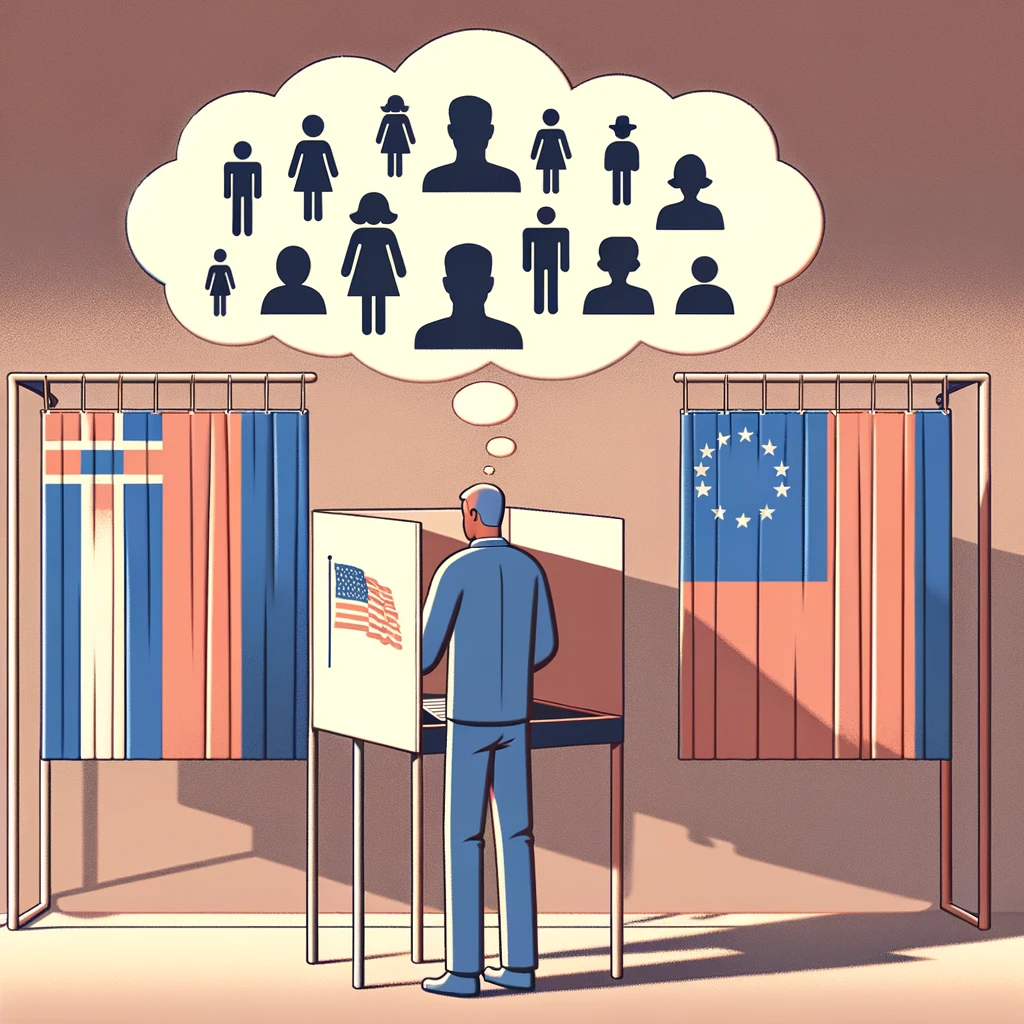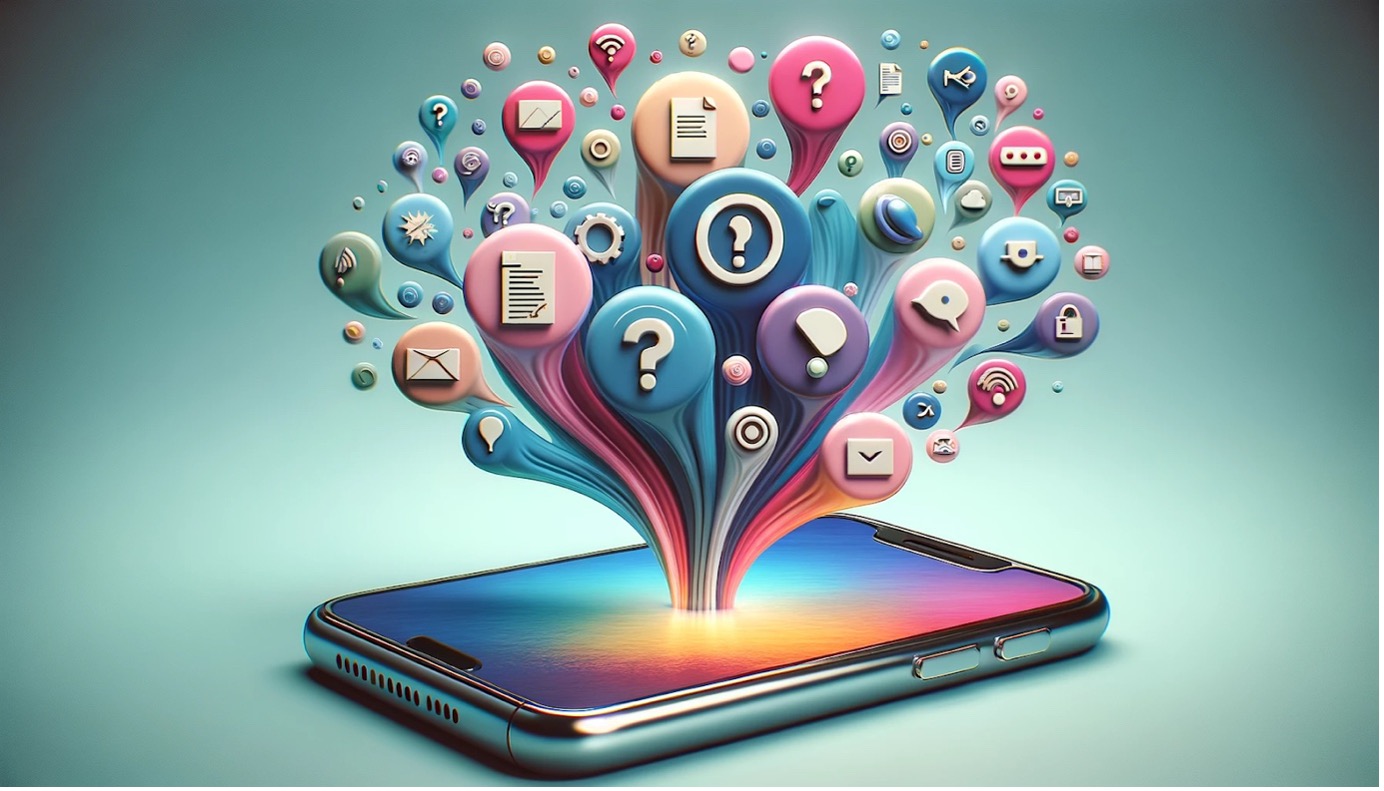Conclusions drawn from the discussion with Myles Dyer – 9th of December (EAVI Conversations 2021)

Whether some of us are conscious or not of the impact our online behaviours have, it is undeniable that they do influence what is happening in the real world. It seems more difficult though to relate whatever we do online to emotions and feelings, that is why it is said the internet causes dehumanization. Depriving someone of his/her human qualities, personality and dignity are relatively easy when we are protected by the distance of cyberspace and the pixels of our screens.
We were keen to ask our guest Myles Dyer (cyber philanthropist) what empathy is exactly and whether is it possible to feel it online.
Often empathy is mistaken with sympathy. While sympathy requires support and approval for what other people are feeling or doing, empathy is just about the ability to simulate within oneself what other people are feeling, even if we are not supportive of their actions. Scientifically, it has been proven that the simulation happens thanks to the brain’s mirror neurons, which will go off and basically replicate to some extent other people’s emotional state. According to Myles, empathy is the idea of putting yourself emotionally in other people’s shoes. Even if it is a quality that should be encouraged, the paradox is that humankind cannot have 100% empathy, as we would be overwhelmed by all the suffering and pain in the world, and the situation would become unmanageable. Of course, empathy is not just compassion, but it can be experienced with joy and laughs, which most of the time translate into social bonding. As with everything in life, we would need to have a good balance!
Empathy is also strictly intertwined with the ability to reach out and communicate, that is why is so important in today’s digital world dominated by ICTs. In the book “Empathetic Civilization” by Jeremy Rifkin[1], the author explains how the concept evolved over time and how communication patterns played a role. People who used to live in tribes had empathy-based across their blood ties, so people belonging to other tribes were considered aliens or enemies. Later, with the Agricultural Revolution, people detribalised and began to associate across religious ties. Even among strangers, the ideology commonalities expanded the circle of people with whom it was possible to empathise. With the Industrial Revolution instead, people were grouped based on nationality (due to the creation of nation-states). Nowadays, thanks to the internet, empathic boundaries are enlarged to the entire globe, thanks to the speed of connection and its geographical covering.
But where is the digital empathy gap visible?
It is important to analyse the quality of human connections we establish online, whether these are meaningful or not. It is tricky to clearly stand on one side of the other, but it really much depends on the individual experiences. Myles thinks that thanks to social media, for example, discussions with friends and relatives start at a much deeper level now, as you might already know what a person has been up to lately (from the newsfeed), therefore one is more likely to talk straight away about experiences and feelings, rather than just facts. On the other hand, it is also true that online communication lacks all the components of a normal conversation (facial expressions, gestures, tone of voice, shaking hands, etc.) and it consists of text only. This is exactly the challenge of the next decade, the collective isolation. Despite the possibility of being connected everywhere and with everyone, and despite our thousands of “friends” on social media, we might feel lonely and isolated.
Therefore, the digital empathy gap could be explained by the quantity constraint of the communication which can take place online (e.g., Twitter character limit), which encourages people to spearhead their thoughts in a concise, blunt, and straightforward way, which gives them space to arguments and hatred online (the online battleground). The absence of soft conversations to get to an understanding is one of the causes of dehumanisation. Besides, anonymity online brings people to engage in savage behavior online because they feel protected and hidden. Hate speech online is challenging because users tend not to think about people on the receiving end, the people they would give abuse at, there are not that many questions around what they are going through. The situation would be different if the same happened in the real world. The quote, ‘it’s very hard to hate people that you know’ clearly illustrates that people are more likely to harbor negative feelings about people they don’t know very well.
Internet though doesn’t only have bad sides. Myles asserted that you can absolutely have meaningful connections online and feel empathy for people you have never met in person. At the end of the day, this is something all of us experienced during the pandemic when we exploited the digital space to overcome the difficulty of isolation and lockdowns. Indeed, 56% of our participants confirmed that social media facilitate social connections especially when part of an online community, while 33% thought that social media are the first steps to build a connection. Even if ours is not a comprehensive sample, people do see benefits and great potential in networking sites when it comes to friendships and relationships.
It is overall possible to teach empathy and as human beings, we do need human connections, but we cannot ignore the digital empathy gap. The real concern is: how big is this gap? Unfortunately, there is no answer yet.
[1] https://www.ted.com/talks/jeremy_rifkin_the_empathic_civilization/up-next
Are you interested in watching the different sessions of the EAVI Conversations 2021?
Conclusions drawn from the discussion with Myles Dyer – 9th of December (EAVI Conversations 2021)

Whether some of us are conscious or not of the impact our online behaviours have, it is undeniable that they do influence what is happening in the real world. It seems more difficult though to relate whatever we do online to emotions and feelings, that is why it is said the internet causes dehumanization. Depriving someone of his/her human qualities, personality and dignity are relatively easy when we are protected by the distance of cyberspace and the pixels of our screens.
We were keen to ask our guest Myles Dyer (cyber philanthropist) what empathy is exactly and whether is it possible to feel it online.
Often empathy is mistaken with sympathy. While sympathy requires support and approval for what other people are feeling or doing, empathy is just about the ability to simulate within oneself what other people are feeling, even if we are not supportive of their actions. Scientifically, it has been proven that the simulation happens thanks to the brain’s mirror neurons, which will go off and basically replicate to some extent other people’s emotional state. According to Myles, empathy is the idea of putting yourself emotionally in other people’s shoes. Even if it is a quality that should be encouraged, the paradox is that humankind cannot have 100% empathy, as we would be overwhelmed by all the suffering and pain in the world, and the situation would become unmanageable. Of course, empathy is not just compassion, but it can be experienced with joy and laughs, which most of the time translate into social bonding. As with everything in life, we would need to have a good balance!
Empathy is also strictly intertwined with the ability to reach out and communicate, that is why is so important in today’s digital world dominated by ICTs. In the book “Empathetic Civilization” by Jeremy Rifkin[1], the author explains how the concept evolved over time and how communication patterns played a role. People who used to live in tribes had empathy-based across their blood ties, so people belonging to other tribes were considered aliens or enemies. Later, with the Agricultural Revolution, people detribalised and began to associate across religious ties. Even among strangers, the ideology commonalities expanded the circle of people with whom it was possible to empathise. With the Industrial Revolution instead, people were grouped based on nationality (due to the creation of nation-states). Nowadays, thanks to the internet, empathic boundaries are enlarged to the entire globe, thanks to the speed of connection and its geographical covering.
But where is the digital empathy gap visible?
It is important to analyse the quality of human connections we establish online, whether these are meaningful or not. It is tricky to clearly stand on one side of the other, but it really much depends on the individual experiences. Myles thinks that thanks to social media, for example, discussions with friends and relatives start at a much deeper level now, as you might already know what a person has been up to lately (from the newsfeed), therefore one is more likely to talk straight away about experiences and feelings, rather than just facts. On the other hand, it is also true that online communication lacks all the components of a normal conversation (facial expressions, gestures, tone of voice, shaking hands, etc.) and it consists of text only. This is exactly the challenge of the next decade, the collective isolation. Despite the possibility of being connected everywhere and with everyone, and despite our thousands of “friends” on social media, we might feel lonely and isolated.
Therefore, the digital empathy gap could be explained by the quantity constraint of the communication which can take place online (e.g., Twitter character limit), which encourages people to spearhead their thoughts in a concise, blunt, and straightforward way, which gives them space to arguments and hatred online (the online battleground). The absence of soft conversations to get to an understanding is one of the causes of dehumanisation. Besides, anonymity online brings people to engage in savage behavior online because they feel protected and hidden. Hate speech online is challenging because users tend not to think about people on the receiving end, the people they would give abuse at, there are not that many questions around what they are going through. The situation would be different if the same happened in the real world. The quote, ‘it’s very hard to hate people that you know’ clearly illustrates that people are more likely to harbor negative feelings about people they don’t know very well.
Internet though doesn’t only have bad sides. Myles asserted that you can absolutely have meaningful connections online and feel empathy for people you have never met in person. At the end of the day, this is something all of us experienced during the pandemic when we exploited the digital space to overcome the difficulty of isolation and lockdowns. Indeed, 56% of our participants confirmed that social media facilitate social connections especially when part of an online community, while 33% thought that social media are the first steps to build a connection. Even if ours is not a comprehensive sample, people do see benefits and great potential in networking sites when it comes to friendships and relationships.
It is overall possible to teach empathy and as human beings, we do need human connections, but we cannot ignore the digital empathy gap. The real concern is: how big is this gap? Unfortunately, there is no answer yet.
[1] https://www.ted.com/talks/jeremy_rifkin_the_empathic_civilization/up-next
Are you interested in watching the different sessions of the EAVI Conversations 2021?
Conclusions drawn from the discussion with Myles Dyer – 9th of December (EAVI Conversations 2021)

Whether some of us are conscious or not of the impact our online behaviours have, it is undeniable that they do influence what is happening in the real world. It seems more difficult though to relate whatever we do online to emotions and feelings, that is why it is said the internet causes dehumanization. Depriving someone of his/her human qualities, personality and dignity are relatively easy when we are protected by the distance of cyberspace and the pixels of our screens.
We were keen to ask our guest Myles Dyer (cyber philanthropist) what empathy is exactly and whether is it possible to feel it online.
Often empathy is mistaken with sympathy. While sympathy requires support and approval for what other people are feeling or doing, empathy is just about the ability to simulate within oneself what other people are feeling, even if we are not supportive of their actions. Scientifically, it has been proven that the simulation happens thanks to the brain’s mirror neurons, which will go off and basically replicate to some extent other people’s emotional state. According to Myles, empathy is the idea of putting yourself emotionally in other people’s shoes. Even if it is a quality that should be encouraged, the paradox is that humankind cannot have 100% empathy, as we would be overwhelmed by all the suffering and pain in the world, and the situation would become unmanageable. Of course, empathy is not just compassion, but it can be experienced with joy and laughs, which most of the time translate into social bonding. As with everything in life, we would need to have a good balance!
Empathy is also strictly intertwined with the ability to reach out and communicate, that is why is so important in today’s digital world dominated by ICTs. In the book “Empathetic Civilization” by Jeremy Rifkin[1], the author explains how the concept evolved over time and how communication patterns played a role. People who used to live in tribes had empathy-based across their blood ties, so people belonging to other tribes were considered aliens or enemies. Later, with the Agricultural Revolution, people detribalised and began to associate across religious ties. Even among strangers, the ideology commonalities expanded the circle of people with whom it was possible to empathise. With the Industrial Revolution instead, people were grouped based on nationality (due to the creation of nation-states). Nowadays, thanks to the internet, empathic boundaries are enlarged to the entire globe, thanks to the speed of connection and its geographical covering.
But where is the digital empathy gap visible?
It is important to analyse the quality of human connections we establish online, whether these are meaningful or not. It is tricky to clearly stand on one side of the other, but it really much depends on the individual experiences. Myles thinks that thanks to social media, for example, discussions with friends and relatives start at a much deeper level now, as you might already know what a person has been up to lately (from the newsfeed), therefore one is more likely to talk straight away about experiences and feelings, rather than just facts. On the other hand, it is also true that online communication lacks all the components of a normal conversation (facial expressions, gestures, tone of voice, shaking hands, etc.) and it consists of text only. This is exactly the challenge of the next decade, the collective isolation. Despite the possibility of being connected everywhere and with everyone, and despite our thousands of “friends” on social media, we might feel lonely and isolated.
Therefore, the digital empathy gap could be explained by the quantity constraint of the communication which can take place online (e.g., Twitter character limit), which encourages people to spearhead their thoughts in a concise, blunt, and straightforward way, which gives them space to arguments and hatred online (the online battleground). The absence of soft conversations to get to an understanding is one of the causes of dehumanisation. Besides, anonymity online brings people to engage in savage behavior online because they feel protected and hidden. Hate speech online is challenging because users tend not to think about people on the receiving end, the people they would give abuse at, there are not that many questions around what they are going through. The situation would be different if the same happened in the real world. The quote, ‘it’s very hard to hate people that you know’ clearly illustrates that people are more likely to harbor negative feelings about people they don’t know very well.
Internet though doesn’t only have bad sides. Myles asserted that you can absolutely have meaningful connections online and feel empathy for people you have never met in person. At the end of the day, this is something all of us experienced during the pandemic when we exploited the digital space to overcome the difficulty of isolation and lockdowns. Indeed, 56% of our participants confirmed that social media facilitate social connections especially when part of an online community, while 33% thought that social media are the first steps to build a connection. Even if ours is not a comprehensive sample, people do see benefits and great potential in networking sites when it comes to friendships and relationships.
It is overall possible to teach empathy and as human beings, we do need human connections, but we cannot ignore the digital empathy gap. The real concern is: how big is this gap? Unfortunately, there is no answer yet.
[1] https://www.ted.com/talks/jeremy_rifkin_the_empathic_civilization/up-next






















































































































































